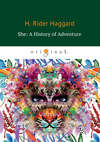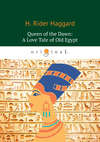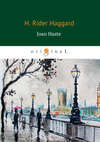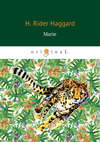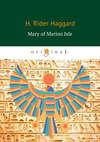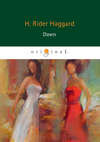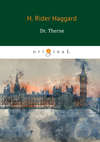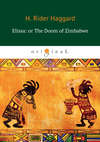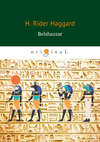Kitabı oku: «The World's Desire», sayfa 11
“Fear not thou, Rei,” said the sweet voice. “Little am I minded to harm thee, or any man, for though many men have gone down the path of darkness because of me, who am a doom to men, not by my will has it been, but by the will of the immortal Gods, who use me to their ends. Rise thou, Rei, and tell me why thou art come hither, and where is he whom I have named?”
Then Rei rose, and looking up saw the light of the Helen’s eyes shining on him through her veil. But there was no anger in them, they shone mildly as stars in an evening sky, and his heart was comforted.
“I know not where the Wanderer is, O thou Immortal,” he said. “This I know only, that he bade me meet him here at one hour before midnight, and so I came.”
“Perchance he too will come anon,” said the sweet voice; “but why did he, whom thou namest the Wanderer, bid thee meet him here?”
“For this reason, O Hathor. He told me that this night he should be wed to thee, and was minded thereafter to fly from Khem with thee. Therefore he bade me come, who am a friend to him, to talk with thee and him as to how thy flight should go, and yet he comes not.”
Now as Rei spake, he turned his face upward, and the Golden Helen looked upon it.
“Hearken, Rei,” she said; “but yesterday, after I had stood upon the pylon tower as the Gods decreed, and sang to those who were ripe to die, I went to my shrine and wove my web while the doomed men fell beneath the swords of them who were set to guard my beauty, but who now are gone. And as I wove, one passed the Ghosts and rent the web and stood before me. It was he whom I await to-night, and after awhile I knew him for Odysseus of Ithaca, Laertes’ son. But as I looked on him and spake with him, behold, I saw a spirit watching us, though he might not see it, a spirit whose face I knew not, for no such man have I known in my life days. Know then, Rei, that the face of the spirit was thy face, and its robes thy robes.”
Then once more Rei trembled in his fear.
“Now, Rei, I bid thee tell me, and speak the truth, lest evil come on thee, not at my hands indeed, for I would harm none, but at the hands of those Immortals who are akin to me. What did thy spirit yonder, in my sacred shrine? How didst thou dare to enter and look upon my beauty and hearken to my words?”
“Oh, great Queen,” said Rei, “I will tell thee the truth, and I pray thee let not the wrath of the Gods fall upon me. Not of my own will did my spirit enter into thy Holy Place, nor do I know aught of what it saw therein, seeing that no memory of it remains in me. Nay, it was sent of her whom I serve, who is the mistress of all magic, and to her it made report, but what it said I know not.”
“And whom dost thou serve, Rei? And why did she send thy spirit forth to spy on me?”
“I serve Meriamun the Queen, and she sent my spirit forth to learn what befell the Wanderer when he went up against the Ghosts.”
“And yet he said naught to me of this Meriamun. Say, Rei, is she fair?”
“Of all women who live upon the earth she is the very fairest.”
“Of all, sayest thou, Rei? Look now, and say if Meriamun, whom thou dost serve, is fairer than Argive Helen, whom thou dost name the Hathor?” and she lifted her veil so that he saw the face that was beneath.
Now when he heard that name, and looked upon the glory of her who is Beauty’s self, Rei shrank back till he went nigh to falling on the earth.
“Nay,” he said, covering his eyes with his hand; “nay thou art fairer than she.”
“Then tell me,” she said, letting fall her veil again, “and for thine own sake tell me true, why would Meriamun the Queen, whom thou servest, know the fate of him who came up against the Ghosts?”
“Wouldst thou know, Daughter of Amen?” answered Rei; “then I will tell thee, for through thee alone she whom I serve and love can be saved from shame. Meriamun doth also love the man whom thou wouldst wed.”
Now when the Golden Helen heard these words, she pressed her hand against her bosom.
“So I feared,” she said, “even so. She loves him, and he comes not. Ah! if it be so! Now, Rei, I am tempted to pay this Queen of thine in her own craft, and send thy spirit forth to spy on her. Nay, that I will not do, for never shall Helen work by shameful guile or magic. Nay – but we will hence, Rei, we will go to the Palace where my rival dwells, there to learn the truth. Fear not, I will bring no ill on thee, nor on her whom thou servest. Lead me to the Palace, Rei. Lead me swiftly.”
Now the Wanderer slept in the arms of Meriamun, who wore the shape of Argive Helen. His golden harness was piled by the golden bed, and by the bed stood the black bow of Eurytus. The night drew on towards the dawning, when of a sudden the Bow awoke and sang, and thus it sang:
“Wake! wake! though the arms of thy Love are about thee, yet dearer by far
Than her kiss is the sound of the fight;
And more sweet than her voice is the cry of the trumpet, and goodlier far
Than her arms is the battle’s delight:
And what eyes are so bright as the sheen of the bronze when the sword is aloft,
What breast is so fair as the shield?
Or what garland of roses is dear as the helm, and what sleep is so soft
As the sleep of slain men on the field?”
Lo! the Snake that was twined about the form of her who wore the shape of Helen heard the magic song. It awoke, it arose. It twisted itself about the body of the Wanderer and the body of her who wore the shape of Helen, knitting them together in the bond of sin. It grew, and lifting its woman’s head on high, it sang in answer. And thus it sang of doom:
“Sleep! be at rest for an hour; as in death men believe they shall rest,
But they wake! And thou too shalt awake!
In the dark of the grave do they stir; but about them, on arms and on breast,
Are the toils and the coils of the Snake:
By the tree where the first lovers lay, did I watch as I watch where he lies,
Love laid on the bosom of Lust!”
Then the great bow answered the Snake, and it sang:
“Of the tree where the first lovers sinned was I shapen; I bid thee arise,
Thou Slayer that soon shall be dust.”
And the Snake sang reply:
“Be thou silent, my Daughter of Death, be thou silent nor wake him from sleep,
With the song and the sound of thy breath.”
The Bow heard the song of the Snake. The Death heard the song of the
Sin, and again its thin music thrilled upon the air. For thus it sang:
“Be thou silent, my Mother of Sin, for this watch it is given me to keep
O’er the sleep of the dealer of Death!”
Then the Snake sang:
“Hush, hush, thou art young, and thou camest to birth when the making was done
Of the world: I am older therein!”
And the Bow answered:
“But without me thy strength were as weakness, the prize of thy strength were unwon.
I am Death, and thy Daughter, O Sin!”
Now the song of the Snake and the song of the Bow sunk through the depths of sleep till they reached the Wanderer’s ears. He sighed, he stretched out his mighty arms, he opened his eyes, and lo! they looked upon the eyes that bent above him, eyes of flame that lit the face of a woman – the face of Meriamun that wavered on a serpent’s neck and suddenly was gone. He cried aloud with fear, and sprang from the couch. The faint light of the dawning crept through the casements and fell upon the bed. The faint light of the dawning fell upon the golden bed of Pharaoh’s Queen, it gleamed upon the golden armour that was piled by the bed, and on the polished surface of the great black bow. It shone upon the face of her who lay in the bed.
Then he remembered. Surely he had slept with the Golden Helen, who was his bride, and surely he had dreamed an evil dream, a dream of a snake that wore the face of Pharaoh’s Queen. Yea, there lay the Golden Helen, won at last – the Golden Helen now made a wife to him. Now he mocked his own fears, and now he bent to wake her with a kiss. Faintly the new-born light crept and gathered on her face; ah! how beautiful she was in sleep. Nay, what was this? Whose face was this beneath his own? Not so had Helen looked in the shrine of her temple, when he tore the web. Not so had Helen seemed yonder in the pillared hall when she stood in the moonlit space – not so had she seemed when he sware the great oath to love her, and her alone. Whose beauty was it then that now he saw? By the Immortal Gods, it was the beauty of Meriamun; it was the glory of the Pharaoh’s Queen!
He stared upon her lovely sleeping face, while terror shook his soul. How could this be? What then had he done?
Then light broke upon him. He looked around the chamber – there on the walls were the graven images of the Gods of Khem, there above the bed the names of Meneptah and Meriamun were written side by side in the sacred signs of Khem. Not with the Golden Helen had he slept, but with the wife of Pharaoh! To her he had sworn the oath, and she had worn the Helen’s shape – and now the spell was broken.
He stood amazed, and as he stood, again the great bow thrilled, warning him of Death to come. Then his strength came back to him, and he seized his armour and girt it about him piece by piece till he lifted the golden helm. It slipped from his hand; with a crash it fell upon the marble floor. With a crash it fell, and she who slept in the bed awoke with a cry, and sprang from the bed, her dark hair streaming down, her night-gear held to her by the golden snake with gemmy eyes that she must ever wear. But he caught his sword in his hand, and threw down the ivory sheath.
BOOK III
I THE VENGEANCE OF KURRI
The Wanderer and Pharaoh’s Queen stood face to face in the twilight of the chamber. They stood in silence, while bitter anger and burning shame poured into his heart and shone from his eyes. But the face of Meriamun was cold as the dead, and on it was a smile such as the carven sphinxes wear. Only her breast heaved tumultuously as though in triumph, and her limbs quivered like a shaken reed. At length she spoke.
“Why lookest thou so strangely on me, my Lord and Love; and why hast thou girded thy harness on thy back? Scarcely doth glorious Ra creep from the breast of Nout, and wouldest thou leave thy bridal bed, Odysseus?”
Still he spoke no word, but looked on her with burning eyes. Then she stretched out her arms and came towards him lover-like. And now he found his tongue again.
“Get thee from me!” he said, in a voice low and terrible to hear; “get thee from me. Dare not to touch me, thou, who art a harlot and a witch, lest I forget my manhood and strike thee dead before me.”
“That thou canst not do, Odysseus,” she answered soft, “for whatever else I be I am thy wife, and thou art bound to me for ever. What was the oath which thou didst swear not five short hours ago?”
“I swore an oath indeed, but not to thee, Meriamun. I swore an oath to Argive Helen, whom I love, and I wake to find thee sleeping at my side, thee whom I hate.”
“Nay,” she said, “to me thou didst swear the oath, Odysseus, for thou, of men the most guileful, hast at length been over-mastered in guile. To me, ‘Woman or Immortal,’ thou didst swear ‘for now and for ever, for here and hereafter, in whatever shape thou goest on the earth, by whatever name thou art known among men.’ Oh, be not wroth, my lord, but hearken. What matters the shape in which thou seest me? At the least am I not fair? And what is beauty but a casket that hides the gem within? ‘Tis my love which thou hast won, my love that is immortal, and not the flesh that perishes. For I have loved thee, ay, and thou hast loved me from of old and in other lives than this, and I tell thee that we shall love again and yet again when thou art no more Odysseus of Ithaca, and when I am no more Meriamun, a Queen of Khem, but while we walk in other forms upon the world and are named by other names. I am thy doom, thou Wanderer, and wherever thou dost wander through the fields of Life and Death I shall be at thy side. For I am She of whom thou art, and thou art He of whom I am, and though the Gods have severed us, yet must we float together down the river of our lives till we find that sea of which the Spirit knows. Therefore put me not from thee and raise not my wrath against thee, for if I used my magic to bring thee to my arms, yet they are thy home.” And once more she came towards him.
Now the Wanderer drew an arrow from his quiver, and set the notch against his breast and the keen barb towards the breast of Meriamun.
“Draw on,” he said. “Thus will I take thee to my arms again. Hearken, Meriamun the witch – Meriamun the harlot: Pharaoh’s wife and Queen of Khem. To thee I swore an oath indeed, and perchance because I suffered thy guile to overcome my wisdom, because I swore upon That which circles thee about, and not by the Red Star which gleams upon the Helen’s breast, it may be that I shall lose her whom I love. So indeed the Queen of Heaven told me, yonder in sea-girt Ithaca, though to my sorrow I forgot her words. But if I lose her or if I win, know this, that I love her and her only, and I hate thee like the gates of hell. For thou hast tricked me with thy magic, thou hast stolen the shape of Beauty’s self and dared to wear it, thou hast drawn a dreadful oath from me, and I have taken thee to wife. And more, thou art the Queen of Khem, thou art Pharaoh’s wife, whom I swore to guard; but thou hast brought the last shame upon me, for now I am a man dishonoured, and I have sinned against the hospitable hearth, and the God of guests and hosts. And therefore I will do this. I will call together the guard of which I am chief, and tell them all thy shame, ay, and all my sorrow. I will shout it in the streets, I will publish it from the temple tops, and when Pharaoh comes again I will call it into his ear, till he and all who live in Khem know thee for what thou art, and see thee in thy naked shame.”
She hearkened, and her face grew terrible to see. A moment she stood as though in thought, one hand pressed to her brow and one upon her breast. Then she spoke.
“Is that thy last word, Wanderer?”
“It is my last word, Queen,” he answered, and turned to go.
Then with the hand that rested on her breast she rent her night robes and tore her perfumed hair. Past him she rushed towards the door, and as she ran sent scream on scream echoing up the painted walls.
The curtains shook, the doors were burst asunder, and through them poured guards, eunuchs, and waiting-women.
“Help,” she cried, pointing to the Wanderer. “Help, help! oh, save mine honour from this evil man, this foreign thief whom Pharaoh set to guard me, and who guards me thus. This coward who dares to creep upon me – the Queen of Khem – even as I slept in Pharaoh’s bed!” and she cast herself upon the floor and threw her hair about her, and lay there groaning and weeping as though in the last agony of shame.
Now when the guards saw how the thing was, a great cry of rage and shame went up from them, and they rushed upon the Wanderer like wolves upon a stag at bay. But he leapt backwards to the side of the bed, and even as he leapt he set the arrow in his hand upon the string of the great black bow. Then he drew it to his ear. The bow-string sang, the arrow rushed forth, and he who stood before it got his death. Again the bow-string sang, again the arrow rushed, and lo! another man was sped. A third time he drew the bow and the soul of a third went down the ways of hell. Now they rolled back from him as the waters roll from a rock, for none dares face the shafts of death. They shot at him with spears and arrows from behind the shelter of the pillars, but none of these might harm him, for some fell from his mail and some he caught upon his buckler.
Now among those who had run thither at the sound of the cries of Meriamun was that same Kurri, the miserable captain of the Sidonians, whose life the Wanderer had spared, and whom he had given to the Queen to be her jeweller. And when Kurri saw the Wanderer’s plight, he thought in his greedy heart of those treasures that he had lost, and of how he who had been a captain and a rich merchant of Sidon was now nothing but a slave.
Then a great desire came upon him to work the Wanderer ill, if so he might. Now all round the edge of the chamber were shadows, for the light was yet faint, and Kurri crept into the shadows, carrying a long spear in his hand, and that spear was hafted into the bronze point which had stood in the Wanderer’s helm. Little did the Wanderer glance his way, for he watched the lances and arrows that flew towards him from the portal, so the end of it was that the Sidonian passed round the chamber unseen and climbed into the golden bed of Pharaoh on the further side of the bed. Now the Wanderer stood with his back to the bed and a spear’s length from it, and in the silken hangings were fixed spears and arrows. Kurri’s first thought was to stab him in the back, but this he did not; first, because he feared lest he should fail to pierce the golden harness and the Wanderer should turn and slay him; and again because he hoped that the Wanderer would be put to death by torment, and he was fain to have a hand in it, for after the fashion of the Sidonians he was skilled in the tormenting of men. Therefore he waited till presently the Wanderer let fall his buckler and drew the bow. But ere the arrow reached his ear Kurri had stretched out his spear from between the hangings and touched the string with the keen bronze, so that it burst asunder and the grey shaft fell upon the marble floor. Then, as the Wanderer cast down the bow and turned with a cry to spring on him who had cut the cord, for his eye had caught the sheen of the outstretched spear, Kurri lifted the covering of the purple web which lay upon the bed and deftly cast it over the hero’s head so that he was inmeshed. Thereon the soldiers and the eunuchs took heart, seeing what had been done, and ere ever the Wanderer could clear himself from the covering and draw his sword, they rushed upon him. Cumbered as he was, they might not easily overcome him, but in the end they bore him down and held him fast, so that he could not stir so much as a finger. Then one cried aloud to Meriamun:
“The Lion is trapped, O Queen! Say, shall we slay him?”
But Meriamun, who had watched the fray through cover of her hands, shuddered and made answer:
“Nay, but lock his tongue with a gag, strip his armour from him, and bind him with fetters of bronze, and make him fast to the dungeon walls with great chains of bronze. There shall he bide till Pharaoh come again; for against Pharaoh’s honour he hath sinned and shamefully broken that oath he swore to him, and therefore shall Pharaoh make him die in such fashion as seems good to him.”
Now when Kurri heard these words, and saw the Wanderer’s sorry plight, he bent over him and said:
“It was I, Kurri the Sidonian, who cut the cord of thy great bow, Eperitus; with the spear-point that thou gavest back to me I cut it, I, whose folk thou didst slay and madest me a slave. And I will crave this boon of Pharaoh, that mine shall be the hand to torment thee night and day till at last thou diest, cursing the day that thou wast born.”
The Wanderer looked upon him and answered: “There thou liest, thou Sidonian dog, for this is written in thy face, that thou thyself shalt die within an hour and that strangely.”
Then Kurri shrank back scowling. But no more words might Odysseus speak, for at once they forced his jaws apart and gagged him with a gag of iron; and thereafter, stripping his harness from him, they bound him with fetters as the Queen had commanded.
Now while they dealt thus with the Wanderer, Meriamun passed into another chamber and swiftly threw robes upon her to hide her disarray, clasping them round her with the golden girdle which now she must always wear. But her long hair she left unbound, nor did she wash the stain of tears from her face, for she was minded to seem shamed and woe-begone in the eyes of all men till Pharaoh came again.
Rei and the Golden Helen passed through the streets of the city till they came to the Palace gates. And here they must wait till the dawn, for Rei, thinking to come thither with the Wanderer, who was Captain of the Guard, had not learned the word of entry.
“Easy would it be for me to win my way through those great gates,” said the Helen to Rei at her side, “but it is my counsel that we wait awhile. Perchance he whom we seek will come forth.”
So they entered the porch of the Temple of Osiris that looked towards the gates, and there they waited till the dawn gathered in the eastern sky. The Helen spoke no word, but Rei, watching her, knew that she was troubled at heart, though he might not see her face because of the veil she wore; for from time to time she sighed and the Red Star rose and fell upon her breast.
At length the first arrow of the dawn fell upon the temple porch and she spoke.
“Now let us enter,” she said; “my heart forebodes evil indeed; but much of evil I have known, and where the Gods drive me there I must go.”
They came to the gates, and the man who watched them opened to the priest Rei and the veiled woman who went with him, though he marvelled at the beauty of the woman’s shape.
“Where are thy fellow-guards?” Rei asked of the soldier.
“I know not,” he answered, “but anon a great tumult rose in the Palace, and the Captain of the Gate went thither, leaving me only to guard the gate.”
“Hast thou seen the Lord Eperitus?” Rei asked again.
“Nay, I have not seen him since supper-time last night, nor has he visited the guard as is his wont.”
Rei passed on wondering, and with him went Helen. As they trod the Palace they saw folk flying towards the hall of banquets that is near the Queen’s chambers. Some bore arms in their hands and some bore none, but all fled east towards the hall of banquets, whence came a sound of shouting. Now they drew near the hall, and there at the further end, where the doors are that lead to the Queen’s chambers, a great crowd was gathered.
“Hide thee, lady – hide thee,” said Rei to her who went with him, “for methinks that death is afoot here. See, here hangs a curtain, stand thou behind it while I learn what this tumult means.”
She stepped behind the curtain that hung between the pillars as Rei bade her, for now Helen’s gentle breast was full of fears, and she was as one dazed. Even as she stepped one came flying down the hall who was of the servants of Rei the Priest.
“Stay thou,” Rei cried to him, “and tell me what happens yonder.”
“Ill deeds, Lord,” said the servant. “Eperitus the Wanderer, whom Pharaoh made Captain of his Guard when he went forth to slay the rebel Apura – Eperitus hath laid hands on the Queen whom he was set to guard. But she fled from him, and her cries awoke the guard, and they fell upon him in Pharaoh’s very chamber. Some he slew with shafts from the great black bow, but Kurri the Sidonian cut the string of the bow, and the Wanderer was borne down by many men. Now they have bound him and drag him to the dungeons, there to await judgment from the lips of Pharaoh. See, they bring him. I must begone on my errand to the keeper of the dungeons.”
The Golden Helen heard the shameful tale, and such sorrow took her that had she been mortal she had surely died. This then was the man whom she had chosen to love, this was he whom last night she should have wed. Once more the Gods had made a mock of her. So had it ever been, so should it ever be. Loveless she had lived all her life days, now she had learned to love once and for ever – and this was the fruit of it! She clasped the curtain lest she should sink to the earth, and hearing a sound looked forth. A multitude of men came down the hall. Before them walked ten soldiers bearing a litter on their shoulders. In the litter lay a man gagged and fettered with fetters of bronze so that he might not stir, and they bore him as men bear a stag from the chase or a wild bull to the sacrifice. It was the Wanderer’s self, the Wanderer overcome at last, and he seemed so mighty even in his bonds, and his eyes shone with so fierce a light, that the crowd shrank from him as though in fear. Thus did Helen see her Love and Lord again as they bore him dishonoured to his dungeon cell. She saw, and a moan and a cry burst from her heart. A moan for her own woe and a cry for the shame and faithlessness of him whom she must love.
“Oh, how fallen art thou, Odysseus, who wast of men the very first,” she cried.
He heard it and knew the voice of her who cried, and he gazed around. The great veins swelled upon his neck and forehead, and he struggled so fiercely that he fell from the litter to the ground. But he might not rise because of the fetters, nor speak because of the gag, so they lifted him again and bore him thence.
And after him went all the multitude save Rei alone. For Rei was fallen in shame and grief because of the tale that he had heard and of the deed of darkness that the man he loved had done. For not yet did he remember and learn to doubt. So he stood hiding his eyes in his hand, and as he stood Helen came forth and touched him on the shoulder, saying:
“Lead me hence, old man. Lead me back to my temple. My Love is lost indeed, but there where I found it I will abide till the Gods make their will clear to me.”
He bowed, saying no word, and following Helen stepped into the centre of the hall. There he stopped, indeed, for down it came the Queen, her hair streaming, all her robes disordered, and her face stained with tears. She was alone save for Kurri the Sidonian, who followed her, and she walked wildly as one distraught who knows not where she goes nor why. Helen saw her also.
“Who is this royal lady that draws near?” she asked of Rei.
“It is Meriamun the Queen; she whom the Wanderer hath brought to shame.”
“Stay then, I would speak with her.”
“Nay, nay,” cried Rei. “She loves thee not, Lady, and will slay thee.”
“That cannot be,” Helen answered.
II THE COMING OF PHARAOH
Presently, as she walked, Meriamun saw Rei the Priest and the veiled woman at his side, and she saw on the woman’s breast a red jewel that burnt and glowed like a heart of fire. Then like fire burned the heart of Meriamun, for she knew that this was Argive Helen who stood before her, Helen whose shape she had stolen like a thief and with the mind of a thief.
“Say,” she cried to Rei, who bowed before her, “say, who is this woman?”
Rei looked at the Queen with terrified eyes, and spake in a voice of warning.
“This is that Goddess who dwells in the Temple of Hathor,” he said. “Let her pass in peace, O Queen.”
“In peace she shall pass indeed,” answered Meriamun. “What saidest thou, old dotard? That Goddess! Nay, no Goddess have we here, but an evil-working witch, who hath brought woes unnumbered upon Khem. Because of her, men die month by month till the vaults of the Temple of Hathor are full of her slain. Because of her it was that curse upon curse fell on the land – the curse of water turned to blood, of hail and of terrible darkness, ay, and the curse of the death of the firstborn among whom my own son died. And thou hast dared, Rei, to bring this witch here to my Palace halls! By Amen if I had not loved thee always thy life should pay the price. And thou,” and she stretched her hand towards the Helen, “thou hast dared to come. It is well, no more shalt thou bring evil upon Khem. Hearken, slave,” and she turned to Kurri the Sidonian; “draw that knife of thine and plunge it to the hilt in the breast of yonder woman. So shalt thou win freedom and all thy goods shall be given thee again.”
Then for the first time Helen spake:
“I charge thee, Lady,” she said in slow soft tones, “bid not thy servant do this deed, for though I have little will to bring evil upon men, yet I may not lightly be affronted.”
Now Kurri hung back doubtfully fingering his dagger.
“Draw, knave, draw!” cried Meriamun, “and do my bidding, or presently thou shalt be slain with this same knife.”
When the Sidonian heard these words he cried aloud with fear, for he well knew that as the Queen said so it would be done to him. Instantly he drew the great knife and rushed upon the veiled woman. But as he came, Helen lifted her veil so that her eyes fell upon his eyes, and the brightness of their beauty was revealed to him; and when he saw her loveliness he stopped suddenly as one who is transfixed of a spear. Then madness came upon him, and with a cry he lifted the knife, and plunging it, not into her heart, but into his own, fell down dead.
This then was the miserable end of Kurri the Sidonian, slain by the sight of the Beauty.
“Thou seest, Lady,” said Helen, turning from the dead Sidonian, “no man may harm me.”
For a moment the Queen stood astonished, while Rei the Priest muttered prayers to the protecting Gods. Then she cried:
“Begone, thou living curse, begone! Wherefore art thou come here to work more woe in this house of woe and death?”
“Fear not,” answered the Helen, “presently I will begone and trouble thee no more. Thou askest why I am come hither. I came to see him who was my love, and whom but last night I should have wed, but whom the Gods have brought to shame unspeakable, Odysseus of Ithaca, Odysseus, Laertes’ son. For this cause I came, and I have stayed to look upon the face of her whose beauty had power to drive the thought of me from the heart of Odysseus, and bring him, who of all men was the greatest hero and the foremost left alive, to do a dastard deed and make his mighty name a byword and a scorn. Knowest thou, Meriamun, that I find the matter strange, since if all else be false, yet is this true, that among women the fairest are the most strong. Thou art fair indeed, Meriamun, but judge if thou art more fair than Argive Helen,” and she drew the veil from her face so that the splendour of her beauty shone out upon the Queen’s dark loveliness. Thus for awhile they stood each facing each, and to Rei it seemed as though the spirits of Death and Life looked one on another, as though the darkness and the daylight stood in woman’s shape before him.

